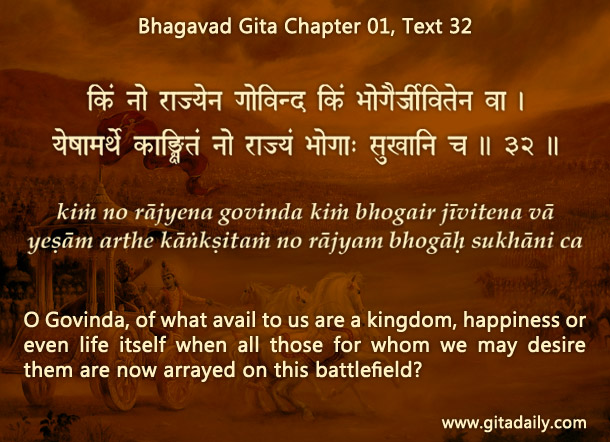The Bhagavad-gita’s first chapter depicts Arjuna subjected to three increasingly intense tensions: emotional, ethical and existential.
Emotional tension: Arjuna was torn between jubilation and apprehension. To signify the start of the war, he blew his conch-shell loudly, thus expressing his confidence, even jubilance (01.15). Within moments, however, as he surveyed the battlefield filled with relatives on both sides, ready to fight till death (01.26), he was overwhelmed by deep reservation, even morbid apprehension (01.27-28).
Ethical tension: Arjuna was torn between two ethical imperatives: his kshatriya-dharma (warrior duty as a martial guardian of society) and kula-dharma (dynastic duty as a leader in the Kuru dynasty). His warrior duty required him to punish aggressors, even taking their lives if necessary. In contrast, his dynastic duty required him to sacrifice for his relatives, even to the point of giving up his own life. What was he to do when those two duties collided head on (01.36) — when the aggressors were his own relatives?
Existential tension: We all have an innate biological drive to survive in the struggle for existence. Simultaneously, we long for more than mere existence: we long for meaningful existence. Arjuna’s survival as a kshatriya required him to regain his kingdom. Yet regaining the kingdom required him to kill the very people for whose service and pleasure he lived. Their death wouldn’t be just another loss for his; it would make his life not worth living (01.32).
Afflicted by these three tensions simultaneously, it is no wonder that Arjuna underwent an epic meltdown (01.46). What is a wonder, however, is that the Bhagavad-gita, in just seven hundred verses that can be recited in an hour, helped him address those tensions.
If we seek to equip ourselves for facing similar tensions, the Bhagavad-gita stands ready to guide us.
One-sentence summary:
When faced with any tension, be it emotional, ethical or existential, Gita wisdom can guide us toward resolution.
Think it over:
- What was Arjuna’s emotional tension?
- What was Arjuna’s ethical tension?
- What was Arjuna’s existential tension?
***
01.32: O Govinda, of what avail to us are a kingdom, happiness or even life itself when all those for whom we may desire them are now arrayed on this battlefield?


Leave A Comment